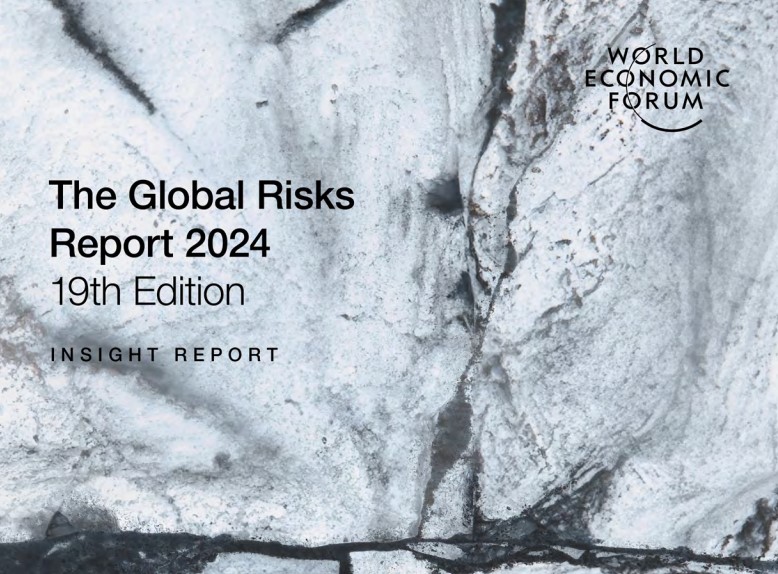
Extreme weather events, and AI generated misinformation and disinformation were the key risks highlighted in the World Economic Forum's (WEF) 19th annual Global Risks Report.
Societal polarisation, cost of living crisis and cyber-attacks were also reported as severe risks on the global landscape by business and government in the current term and coming years.
The 2024 report highlights a predominantly negative outlook for the world over the next two years that is expected to worsen over the next decade.
Countries are grappling with the impacts of record-breaking extreme weather, as climate-change adaptation efforts and resources fall short of the type, scale and intensity of climate related events already taking place. Cost-of-living pressures continue to bite amidst persistently elevated inflation and interest rates and continued economic uncertainty in much of the world.
This was reflected in the previous year's report as well which underlined cost of living crisis and extreme weather events as the top two global risks.
This report lists 34 global risks, divided into five categories – economic, environmental, geopolitical, societal, and technological. It highlights the findings from the annual Global Risks Perception Survey (GRPS), which brings together the responses of nearly 1,500 global leaders across academia, business, government, the international community, and civil society.
Global risks ranked by severity over next two years:
- Misinformation and disinformation
- Extreme weather events
- Societal polarization
- Cyber security
- Interstate armed conflict
- Lack of economic opportunity
- Inflation
- Involuntary migration
- Economic downturn
- Pollution
Global risks ranked by severity over next 10 years:
- Extreme weather events
- Critical change to Earth systems
- Biodiversity loss and ecosystem collapse
- Natural resource shortages
- Misinformation and disinformation
- Adverse outcomes of AI technologies
- Involuntary migration
- Cyber security
- Societal polarization
- Pollution
Responding to global risks
The world is currently going through some big changes right now. AI has taken centre stage, climate change is causing major shifts in our environment, power dynamics are shifting around the world, and changes in population demographics. With all of this going on, it's important for to be prepared and take action to deal with the risks that come with these transformations.
Localised strategies, breakthrough endeavours, collective actions and cross-border coordination are the key solutions that can play a part in addressing these risks.
These actions can be taken individually or collectively to implement preparedness measures for the risks we cannot avoid – and to come together to prevent or lessen the likelihood of the risks that we can.
Localised strategies
There's a real sense of urgency to adapt and avoid the worst effects of climate change. One way we can do that is by taking action at the local level. Local measures are a quicker and more flexible way to respond to such risks, without getting bogged down in the long processes of global agreements. These measures can include things like making our buildings more resilient, investing in wildfire management, improving flood defences, and finding ways to deal with heatwaves. And it's not just about climate change - investing in infrastructure can also help us be better prepared for things like pandemics. West Australian Local Government Association (WALGA) has long been committed towards reducing the impact of climate change through initiatives like expanding tree canopies in metro areas; bringing in alternative renewable energy solutions; transition to zero emissions transport; and adapting energy efficient LED street lighting.
Breakthrough endeavours
Breakthrough endeavours often involve research and development (R&D) such as making medical breakthroughs, developing new technologies, or coming up with innovative ways to understand and manage risks. R&D can play a crucial role in addressing health, environmental, and technological risks. We saw this during the COVID-19 pandemic, where the focused efforts of a few pharmaceutical companies made a huge difference for the global community.
Collective actions
Collective action is not the result of collaboration, but of the aggregate and independent effort of single citizens, companies and countries. Examples include expanding the adoption of a vegetarian diet or reducing combustion-engine cars and air travel to slash carbon emissions. Local governments can involve their community to bring in a collective change at their level by introducing initiatives that can help reduce the impact of climate change.
These changes in lifestyle or consumption patterns are insignificant when pursued by a single individual. But if a material number of people take such actions concurrently, such aggregate efforts have the power to alter market dynamics and move the dial on climate-change mitigation.
The same is true for business actions. If a critical number of companies commit to building ethical supply chains, respect for human rights and labour standards will improve worldwide.
To discuss the risk outlook for your local government, please get in touch with your LGIS account manager.